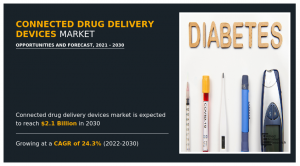PORTLAND, OR, UNITED STATES, November 28, 2024 /EINPresswire.com/ -- The global connected drug delivery devices market is experiencing significant growth, projected to expand from $290.3 million in 2021 to $2.1 billion by 2030, reflecting a compound annual growth rate (CAGR) of 24.3% from 2022 to 2030. This surge is driven by the increasing demand for innovative healthcare solutions that enhance patient monitoring and medication adherence.
𝐆𝐞𝐭 𝐚 𝐒𝐚𝐦𝐩𝐥𝐞 𝐂𝐨𝐩𝐲 𝐨𝐟 𝐭𝐡𝐢𝐬 𝐑𝐞𝐩𝐨𝐫𝐭: https://www.alliedmarketresearch.com/request-sample/A26017
Overview of Connected Drug Delivery Devices
Connected drug delivery devices are smart systems that integrate wireless technology to facilitate patient care in home settings. These devices include various features such as:
• Sensors: Monitor medication intake and patient health metrics.
• Adherence Trackers: Help ensure patients follow their prescribed medication schedules.
• Dose Reminders: Notify patients when it's time to take their medication.
• Monitoring Systems: Provide real-time feedback and educational resources.
These devices are particularly beneficial for managing chronic conditions like asthma, diabetes, and hypertension, making them a cost-effective alternative to traditional clinic-based treatments.
Market Segmentation
The connected drug delivery devices market can be segmented into several categories:
• By Type:
• Injectable Devices
• Inhalation Devices
• Others
• By Technology:
• NFC (Near Field Communication)
• Bluetooth
• Others
• By End-User:
• Homecare Settings
• Hospitals
Key Insights by Segment
• Injectable Devices: Expected to hold the largest market share due to their advantages over traditional methods and the rising prevalence of chronic diseases.
• Inhalation Devices: Growth driven by increasing respiratory conditions like COPD and asthma.
• Bluetooth Technology: Dominates the technology segment due to its compatibility with smartphones, enhancing user experience.
Drivers of Market Growth
Several factors are fueling the growth of the connected drug delivery devices market:
• Rising Medical Costs: The need for more affordable healthcare solutions is pushing patients towards home-based care options.
• Chronic Disease Prevalence: An increase in chronic health conditions necessitates effective monitoring and management solutions.
• Preventive Care Emphasis: A growing focus on preventive healthcare is leading to higher adoption rates of connected devices.
Challenges Facing the Market
Despite the promising growth, the market faces challenges, particularly regarding:
• Data Security Concerns: Risks associated with breaches of sensitive patient information could hinder market expansion.
• Cybersecurity Threats: Potential threats to hospital systems pose significant risks to patient safety and data integrity.
Future Outlook
As awareness about the benefits of connected drug delivery systems grows, their adoption is expected to accelerate. Key industry players such as Adherium, BD, and F. Hoffmann-La Roche Ltd are actively developing innovative solutions that enhance patient engagement and compliance.
Conclusion
The connected drug delivery devices market represents a transformative opportunity in healthcare, offering enhanced patient outcomes through improved medication adherence and monitoring capabilities. As technological advancements continue, this sector is poised for substantial growth, addressing both patient needs and healthcare efficiency.
𝐄𝐧𝐪𝐮𝐢𝐫𝐞 𝐁𝐞𝐟𝐨𝐫𝐞 𝐁𝐮𝐲𝐢𝐧𝐠: https://www.alliedmarketresearch.com/purchase-enquiry/A26017

𝐆𝐞𝐭 𝐚 𝐒𝐚𝐦𝐩𝐥𝐞 𝐂𝐨𝐩𝐲 𝐨𝐟 𝐭𝐡𝐢𝐬 𝐑𝐞𝐩𝐨𝐫𝐭: https://www.alliedmarketresearch.com/request-sample/A26017
Overview of Connected Drug Delivery Devices
Connected drug delivery devices are smart systems that integrate wireless technology to facilitate patient care in home settings. These devices include various features such as:
• Sensors: Monitor medication intake and patient health metrics.
• Adherence Trackers: Help ensure patients follow their prescribed medication schedules.
• Dose Reminders: Notify patients when it's time to take their medication.
• Monitoring Systems: Provide real-time feedback and educational resources.
These devices are particularly beneficial for managing chronic conditions like asthma, diabetes, and hypertension, making them a cost-effective alternative to traditional clinic-based treatments.
Market Segmentation
The connected drug delivery devices market can be segmented into several categories:
• By Type:
• Injectable Devices
• Inhalation Devices
• Others
• By Technology:
• NFC (Near Field Communication)
• Bluetooth
• Others
• By End-User:
• Homecare Settings
• Hospitals
Key Insights by Segment
• Injectable Devices: Expected to hold the largest market share due to their advantages over traditional methods and the rising prevalence of chronic diseases.
• Inhalation Devices: Growth driven by increasing respiratory conditions like COPD and asthma.
• Bluetooth Technology: Dominates the technology segment due to its compatibility with smartphones, enhancing user experience.
Drivers of Market Growth
Several factors are fueling the growth of the connected drug delivery devices market:
• Rising Medical Costs: The need for more affordable healthcare solutions is pushing patients towards home-based care options.
• Chronic Disease Prevalence: An increase in chronic health conditions necessitates effective monitoring and management solutions.
• Preventive Care Emphasis: A growing focus on preventive healthcare is leading to higher adoption rates of connected devices.
Challenges Facing the Market
Despite the promising growth, the market faces challenges, particularly regarding:
• Data Security Concerns: Risks associated with breaches of sensitive patient information could hinder market expansion.
• Cybersecurity Threats: Potential threats to hospital systems pose significant risks to patient safety and data integrity.
Future Outlook
As awareness about the benefits of connected drug delivery systems grows, their adoption is expected to accelerate. Key industry players such as Adherium, BD, and F. Hoffmann-La Roche Ltd are actively developing innovative solutions that enhance patient engagement and compliance.
Conclusion
The connected drug delivery devices market represents a transformative opportunity in healthcare, offering enhanced patient outcomes through improved medication adherence and monitoring capabilities. As technological advancements continue, this sector is poised for substantial growth, addressing both patient needs and healthcare efficiency.
𝐄𝐧𝐪𝐮𝐢𝐫𝐞 𝐁𝐞𝐟𝐨𝐫𝐞 𝐁𝐮𝐲𝐢𝐧𝐠: https://www.alliedmarketresearch.com/purchase-enquiry/A26017
David Correa
Allied Market Research
+1 800-792-5285
email us here
Visit us on social media:
Facebook
X
Legal Disclaimer:
EIN Presswire provides this news content "as is" without warranty of any kind. We do not accept any responsibility or liability for the accuracy, content, images, videos, licenses, completeness, legality, or reliability of the information contained in this article. If you have any complaints or copyright issues related to this article, kindly contact the author above.


